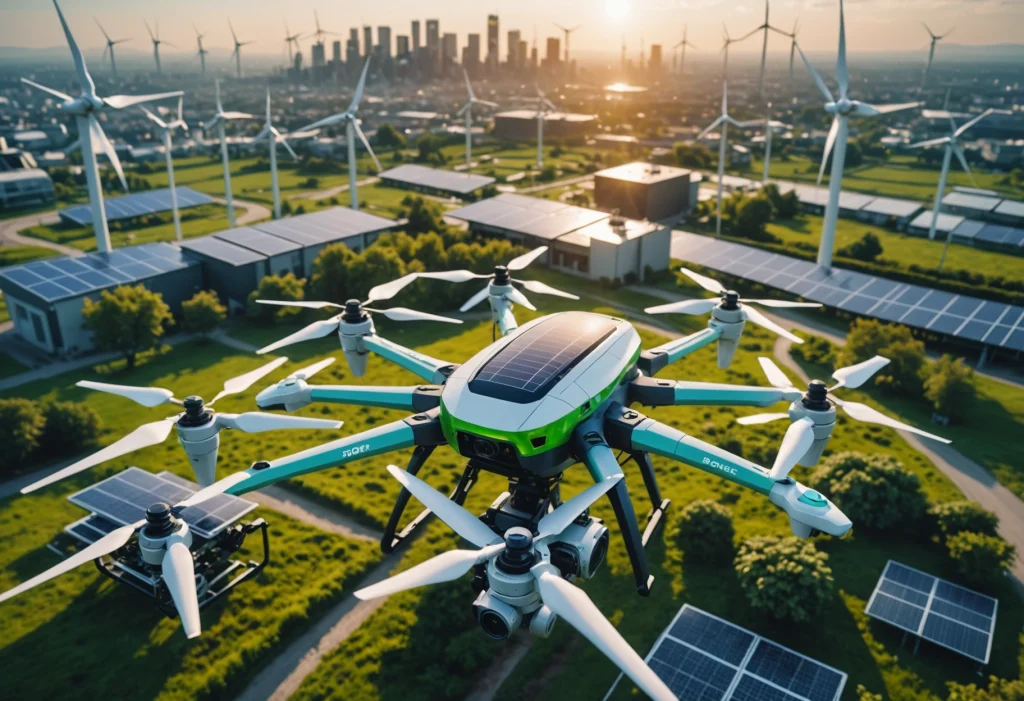В современном мире, где экологические вызовы становятся все более актуальными, искусственный интеллект становится мощным инструментом для продвижения устойчивого развития. От оптимизации энергопотребления до мониторинга изменения климата, технологии ИИ используются для решения некоторых из самых насущных глобальных проблем. В этой статье рассматриваются различные способы, с помощью которых ИИ вносит вклад в более устойчивое будущее, с акцентом на ключевые применения и их потенциальное воздействие.
Одной из наиболее значимых областей, где ИИ вносит изменения, является управление энергетикой. Умные сети, работающие на алгоритмах ИИ, могут прогнозировать спрос на энергию и оптимизировать ее распределение, сокращая отходы и повышая эффективность. Например, такие компании, как Google, используют ИИ для управления системами охлаждения центров обработки данных, что приводит к значительной экономии энергии. Аналогично, в секторах возобновляемой энергетики ИИ помогает прогнозировать погодные условия для максимизации выработки солнечных и ветровых электростанций, обеспечивая стабильные и экологически чистые поставки энергии.
Другим важным применением является сельское хозяйство, где методы точного земледелия на основе ИИ позволяют фермерам более эффективно использовать ресурсы. Анализируя данные с датчиков и спутников, ИИ может рекомендовать оптимальные сроки посадки, графики полива и меры борьбы с вредителями. Это не только повышает урожайность, но и минимизирует использование воды, удобрений и пестицидов, тем самым снижая деградацию окружающей среды. Проекты в таких странах, как Нидерланды, демонстрируют, как ИИ может привести к более устойчивым системам производства продуктов питания.
В сфере мониторинга изменения климата ИИ играет ключевую роль в обработке огромных объемов экологических данных. Модели машинного обучения анализируют спутниковые изображения для отслеживания вырубки лесов, мониторинга здоровья океанов и прогнозирования природных катастроф, таких как ураганы и наводнения. Организации, такие как NASA и Европейское космическое агентство, используют ИИ для повышения своих наблюдательных возможностей, предоставляя ценные insights для политиков и исследователей, работающих над стратегиями смягчения последствий изменения климата.
Управление отходами — еще одна область инноваций ИИ. Умные системы сортировки, основанные на компьютерном зрении, могут идентифицировать и отделять перерабатываемые материалы от потоков отходов, увеличивая уровень переработки и сокращая использование свалок. Кроме того, алгоритмы ИИ оптимизируют логистику сбора отходов, минимизируя потребление топлива и выбросы. Города по всему миру внедряют эти технологии для перехода к циркулярной экономике.
Транспортный сектор также претерпевает трансформацию с помощью ИИ. Автономные транспортные средства и интеллектуальные системы управления дорожным движением могут уменьшить заторы и снизить выбросы за счет оптимизации маршрутов и моделей вождения. Сети электромобилей (EV) используют ИИ для эффективного управления зарядными станциями, поддерживая переход к более чистым решениям в области мобильности. Такие компании, как Tesla, находятся на переднем крае, интегрируя ИИ для улучшения срока службы батарей и общей производительности транспортных средств.
Помимо этих применений, ИИ способствует устойчивому развитию через инновации в материаловедении. Моделируя и тестируя новые материалы в ускоренном темпе, ИИ помогает разрабатывать экологически чистые альтернативы пластику и другим загрязнителям. Это ускоряет создание биоразлагаемых продуктов и поддерживает переход к более устойчивой производственной промышленности.
Однако интеграция ИИ в усилия по устойчивому развитию не обходится без проблем. Такие вопросы, как конфиденциальность данных, алгоритмическая предвзятость и энергопотребление самих систем ИИ, должны быть решены. Например, обучение больших моделей ИИ может быть энергоемким, потенциально сводя на нет некоторые экологические преимущества. Поэтому крайне важно разрабатывать энергоэффективные технологии ИИ и обеспечивать их этичное и инклюзивное развертывание.
В заключение, искусственный интеллект обладает огромным потенциалом для стимулирования устойчивого развития в различных секторах. Повышая эффективность, сокращая отходы и предоставляя инновационные решения, ИИ может помочь человечеству более эффективно решать экологические проблемы. По мере развития технологий совместные усилия правительств, отраслей и исследовательских институтов будут ключевыми для использования ИИ в интересах более зеленого и устойчивого будущего.

